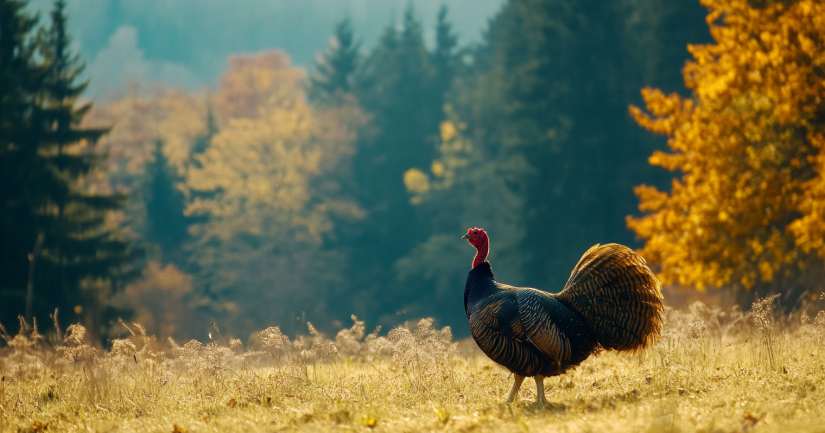
This Turkey Quiz offers a fun and engaging way to explore the rich culture, history, and geography of this fascinating country. How Well Do You Know These Fascinating Birds? Turkeys are more than just a holiday symbol. This Turkey Quiz will test your knowledge of these impressive birds, known for their elaborate courtship displays, keen intelligence, and strong survival skills. Native to North America, turkeys thrive in forests, grasslands, and even suburban areas. Their sharp eyesight and powerful legs make them one of the most adaptable ground birds.
Turkeys belong to the Phasianidae family, which also includes pheasants and quails. The Wild Turkey (Meleagris gallopavo) is the species from which domestic turkeys were bred. Unlike their farm-raised counterparts, wild turkeys are strong fliers, capable of reaching speeds of 55 mph (88 km/h) over short distances.
Turkeys are unique, but there’s more to explore! Discover the elegant swan in the Swan Quiz or the lively sparrow in the Sparrow Quiz.
Ready to Test Yourself? Start the Turkey Quiz
What Makes Turkeys Unique? Key Facts for the Turkey Quiz
Males, called toms, are famous for their colorful wattles, snoods, and fanned tail feathers. During mating season, they perform impressive strutting displays, puffing up their feathers and producing deep gobbling sounds. Females, or hens, choose mates based on size, plumage, and vocal strength.
Where Do Turkeys Live? Exploring Their Habitat and Behavior
Wild turkeys are found across North America, from dense woodlands to open fields. They prefer areas with plenty of cover, using trees and shrubs to avoid predators. At night, they roost in trees, a habit that helps them stay safe from ground threats like coyotes and foxes.
These birds are highly social and form flocks, communicating with a variety of sounds. Their gobbling call can be heard from over a mile away. Turkeys also use clucks, purrs, and yelps to warn others of danger or signal food sources.
Why Are Turkeys Important to Ecosystems?
Turkeys play a key role in forest ecosystems. Their diet includes acorns, seeds, berries, insects, and small reptiles, helping control insect populations and aid in seed dispersal. By scratching the ground in search of food, they turn over soil, benefiting plant growth.
Their presence also supports predator-prey relationships. Many animals, including bobcats, owls, and hawks, rely on turkeys as a food source. The balance they maintain within their habitat makes them an essential species in North American wildlife.
Are Turkeys at Risk? Conservation and Population Trends
Wild turkeys were once on the brink of extinction due to hunting and habitat destruction. Conservation efforts in the 20th century helped their populations rebound. Today, regulated hunting and habitat protection keep their numbers stable.
To ensure their survival, conservationists focus on:
- Protecting forests and open woodlands for nesting and foraging
- Preventing overhunting through seasonal regulations
- Restoring native plants that provide food and shelter
These efforts help sustain turkey populations for future generations.
Are You Ready to Take the Turkey Quiz?
Now that you’ve explored the behavior, habitat, and ecological role of turkeys, it’s time to put your knowledge to the test! This Turkey Quiz will challenge you with exciting questions about their survival skills, communication, and adaptations. See how much you know—start the quiz now!
Check out our FULL collection of Bird Quizzes!
Turkey – FAQ
Turkey is renowned for its rich cultural heritage and stunning landscapes. Key attractions include the ancient city of Ephesus, the breathtaking landscapes of Cappadocia, and the vibrant energy of Istanbul, which boasts landmarks like the Hagia Sophia and the Blue Mosque. Additionally, the beaches of the Mediterranean and Aegean coasts, such as those in Antalya and Bodrum, are popular destinations for relaxation and water sports.
The ideal time to visit Turkey largely depends on the region. Generally, spring (April to June) and fall (September to October) are considered the best seasons, as the weather is mild and pleasant. Summer can be hot, especially in inland areas and along the southern coast, while winter brings colder temperatures, particularly in eastern regions, making it suitable for skiing in places like Uludağ.
Turkey is generally safe for tourists, though, like any destination, it’s wise to remain vigilant. It is advisable to check travel advisories from your government before planning your trip.
Visitors to Turkey should be respectful of local customs and traditions. Dress modestly, especially when visiting religious sites, and be mindful of local etiquette, such as greeting with a handshake or offering a polite nod.
